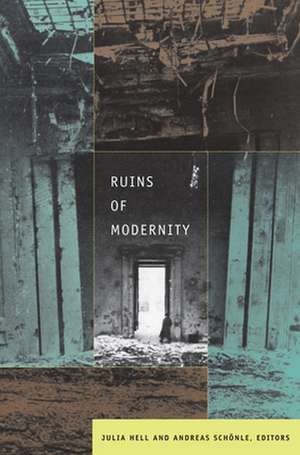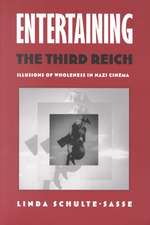Ruins of Modernity: Politics, History, and Culture
Autor Julia Hell, Andreas Schönleen Limba Engleză Paperback – 18 mar 2010
Din seria Politics, History, and Culture
-
 Preț: 240.73 lei
Preț: 240.73 lei -
 Preț: 210.26 lei
Preț: 210.26 lei -
 Preț: 247.63 lei
Preț: 247.63 lei -
 Preț: 265.79 lei
Preț: 265.79 lei -
 Preț: 238.39 lei
Preț: 238.39 lei -
 Preț: 261.56 lei
Preț: 261.56 lei -
 Preț: 263.47 lei
Preț: 263.47 lei -
 Preț: 306.60 lei
Preț: 306.60 lei -
 Preț: 264.26 lei
Preț: 264.26 lei -
 Preț: 305.61 lei
Preț: 305.61 lei -
 Preț: 262.70 lei
Preț: 262.70 lei -
 Preț: 303.33 lei
Preț: 303.33 lei -
 Preț: 262.52 lei
Preț: 262.52 lei -
 Preț: 212.48 lei
Preț: 212.48 lei -
 Preț: 261.56 lei
Preț: 261.56 lei -
 Preț: 262.32 lei
Preț: 262.32 lei -
 Preț: 230.02 lei
Preț: 230.02 lei -
 Preț: 237.47 lei
Preț: 237.47 lei -
 Preț: 335.88 lei
Preț: 335.88 lei -
 Preț: 300.83 lei
Preț: 300.83 lei -
 Preț: 261.56 lei
Preț: 261.56 lei -
 Preț: 238.39 lei
Preț: 238.39 lei -
 Preț: 238.01 lei
Preț: 238.01 lei -
 Preț: 262.14 lei
Preț: 262.14 lei -
 Preț: 260.41 lei
Preț: 260.41 lei -
 Preț: 310.83 lei
Preț: 310.83 lei -
 Preț: 300.24 lei
Preț: 300.24 lei -
 Preț: 335.12 lei
Preț: 335.12 lei -
 Preț: 234.61 lei
Preț: 234.61 lei -
 Preț: 223.65 lei
Preț: 223.65 lei -
 Preț: 256.06 lei
Preț: 256.06 lei
Preț: 312.74 lei
Nou
Puncte Express: 469
Preț estimativ în valută:
59.86€ • 65.05$ • 50.32£
59.86€ • 65.05$ • 50.32£
Carte tipărită la comandă
Livrare economică 21 aprilie-05 mai
Preluare comenzi: 021 569.72.76
Specificații
ISBN-13: 9780822344742
ISBN-10: 0822344742
Pagini: 528
Ilustrații: 83 illustrations
Dimensiuni: 158 x 232 x 31 mm
Greutate: 0.77 kg
Editura: MD – Duke University Press
Seria Politics, History, and Culture
Locul publicării:United States
ISBN-10: 0822344742
Pagini: 528
Ilustrații: 83 illustrations
Dimensiuni: 158 x 232 x 31 mm
Greutate: 0.77 kg
Editura: MD – Duke University Press
Seria Politics, History, and Culture
Locul publicării:United States
Cuprins
Contents; List of Illustrations; Acknowledgments: Julia Hell and Andreas Schönle, Introduction; 1. Catastrophe, Utopia, and the Architecture of Destruction; Andreas Huyssen, Authentic Ruins: Products of Modernity; Anthony Vidler, Airwar and Architecture; Vladimir Paperny, Modernism and Destruction in Architecture; Svetlana Boym, Ruins of the Avant-Garde: From Tatlins Tower to the Paper Architecture; 2. Ruins and the Democratic Polity; Andreas Schönle, Modernity as a Destroyed Anthill: Tolstoy on History and the Aesthetics of Ruins; Russell A. Berman, Democratic Destruction: Ruins and Emancipation in the American Tradition; Jonathan Bolton, The Ruins of a Republic: Czech Modernism after Munich, 19381939; Amir Eshel, Layered Time: Ruins as Shattered Past; Ruins as Hope in Israeli and German Landscapes; Lucia Saks, Cities, Citizenship and other Joburg Stories; 3. Empire, Ruins, and Their Stories; Julia Hell, Imperial Ruin Gazers, or Why did Scipio Weep?; Todd Samuel Presner, Hegels Philosophy of World History via Sebalds Imaginary of Ruins: A Contrapuntal Critique of the New Space of Modernity; Jon Beasley-Murray, Vilcashuamán: Telling Stories in Ruins; Daniel Herwitz, The Monument in Ruins; Rahul Mehrotra, Simultaneous Modernity: Negotiations and Resistances in Urban India; 4. (Post-)Ruinscapes; Helmut Puff, Ruins as Models: Displaying Destruction in Postwar Germany; Kerstin Barndt, Memory Traces of an Abandoned Set of Futures. Industrial Ruins in the Post-Industrial Landscapes of Germany; George Steinmetz, Colonial Melancholy and Fordist Nostalgia: The Ruinscapes of Namibia and Detroit; Jonathan Veitch, Doctor Strangeloves Cabinet of Wonder: Sifting through the Atomic Ruins at the Nevada Test Site; Gustavo Verdesio, Invisible at a Glance: Indigenous Cultures of the Past, Ruins, Archaeological Sites, and Our Regimes of Visibility; 5. Ruin Gazing; Alexander Regier, Foundational Ruins: The Lisbon Earthquake and the Sublime; Tatiana Smoliarova, The Promise of a Ruin: Gavriil Derzhavins Archaic Modernity; Johannes von Moltke, Ruin Cinema; Eric Rentschler, The Place of Rubble in the Trümmerfilm; Helen Petrovsky, Lost In Time: Boris Mikhailov and his Study of the SovietBibliography; Contributors; Index; Contributors
Recenzii
The scope of this book is ambitious; the execution is masterful. It is a superb collection of reflections by major scholars on the pervasive presence of ruins in contemporary cultures. It is sure to find a wide readership among urban historians, scholars of modernity, scholars and students of German, European, and post-Soviet studies, film scholars, and art historians.Ulrich Baer, author of Spectral Evidence: The Photography of Trauma Ever since Shelleys traveler returned from an antique land with news of the shattered statue of Ozymandias, king of kings, we have pondered the sober lessons of ruins and their mockery of human pretension. In this remarkable collection assembled by Julia Hell and Andreas Schönle, the ruinscape is that of the modern world and the gazes fall as much on our prior attempts to make sense of it as on the ruins themselves.Martin Jay, author of Songs of Experience: Modern American and European Variations on a Universal Theme
"The scope of this book is ambitious; the execution is masterful. It is a superb collection of reflections by major scholars on the pervasive presence of ruins in contemporary cultures. It is sure to find a wide readership among urban historians, scholars of modernity, scholars and students of German, European, and post-Soviet studies, film scholars, and art historians."--Ulrich Baer, author of Spectral Evidence: The Photography of Trauma "Ever since Shelley's traveler returned from an 'antique land' with news of the shattered statue of Ozymandias, king of kings, we have pondered the sober lessons of ruins and their mockery of human pretension. In this remarkable collection assembled by Julia Hell and Andreas Schonle, the ruinscape is that of the modern world and the gazes fall as much on our prior attempts to make sense of it as on the ruins themselves."--Martin Jay, author of Songs of Experience: Modern American and European Variations on a Universal Theme
"The scope of this book is ambitious; the execution is masterful. It is a superb collection of reflections by major scholars on the pervasive presence of ruins in contemporary cultures. It is sure to find a wide readership among urban historians, scholars of modernity, scholars and students of German, European, and post-Soviet studies, film scholars, and art historians."--Ulrich Baer, author of Spectral Evidence: The Photography of Trauma "Ever since Shelley's traveler returned from an 'antique land' with news of the shattered statue of Ozymandias, king of kings, we have pondered the sober lessons of ruins and their mockery of human pretension. In this remarkable collection assembled by Julia Hell and Andreas Schonle, the ruinscape is that of the modern world and the gazes fall as much on our prior attempts to make sense of it as on the ruins themselves."--Martin Jay, author of Songs of Experience: Modern American and European Variations on a Universal Theme
Textul de pe ultima copertă
"The scope of this book is ambitious; the execution is masterful. It is a superb collection of reflections by major scholars on the pervasive presence of ruins in contemporary cultures. It is sure to find a wide readership among urban historians; scholars of modernity; scholars and students of German, European, and post-Soviet studies; film scholars; and art historians."--Ulrich Baer, author of "Spectral Evidence: The Photography of Trauma"
Notă biografică
Descriere
Uses the concept of the ruin to study modernity, asking whether there is an intrinsic logic of "ruin" at work in modernity






